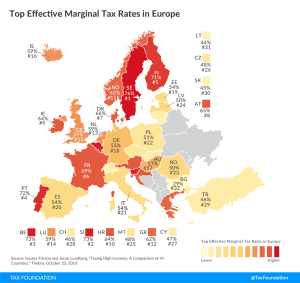
Daniel Bunn is President and CEO of the Tax Foundation. Daniel has been with the organization since 2018 and, prior to becoming President, successfully built its Center for Global Tax Policy, expanding the Tax Foundation’s reach and impact around the world.
Prior to joining the Tax Foundation, Daniel worked in the United States Senate at the Joint Economic Committee as part of Senator Mike Lee’s (R-UT) Social Capital Project and on the policy staff for both Senator Lee and Senator Tim Scott (R-SC). In his time in the Senate, Daniel developed legislative initiatives on tax, trade, regulatory, and budget policy.
He has a master’s degree in Economic Policy from Central European University in Budapest, Hungary, and a bachelor’s degree in Business Administration from North Greenville University in South Carolina.
Daniel lives in Halethorpe, Maryland, with his wife and their three children.
Latest Work


How Controlled Foreign Corporation Rules Look Around the World: Germany
Germany has had a Controlled Foreign Corporation (CFC) regime since 1972, when the German Foreign Transactions Tax Act was enacted. Under the German regime, a CFC is a foreign company where its capital or voting rights are either directly or indirectly majority-owned by German residents at the end of its fiscal year.
6 min read
Bracing for Impact
Though they are limited by both data and assumptions, the OECD will face similar limitations. As policymakers work to fine-tune the proposals under both Pillar 1 and 2 the impact assessment should be a critical part of that discussion.
6 min read
How Controlled Foreign Corporation Rules Look Around the World: Spain
The CFC legislation in Spain is not as complicated as it is in some other countries, and it is aligned with the standards recommended by the OECD. The Spanish rules have evolved in a way that the rules are designed to comply with the EU principles not to interrupt the functioning of the Union and its single market.
4 min read
Profit Shifting: Evaluating the Evidence and Policies to Address It
The OECD has been working to assess the impact of their program of work, and it will be critical for this assessment to take into account impacts not only on revenues, but also on growth and investment.
7 min read
The Davos Digital (Tax) Détente?
The past week has been nearly nonstop with news on various fronts of a dispute over taxation of digital businesses. The main characters have been the U.S., France, and the UK, although the EU and the OECD have also played roles. Though the dust is still settling, it is worth trying to tie the various events and arguments together.
7 min read
How Controlled Foreign Corporation Rules Look Around the World: France
In France, Controlled Foreign Corporation (CFC) rules were first enacted in 1980. The French tax regime operates on a strict territorial basis, where only profits generated in the country are subject to tax in France.
5 min read
How Controlled Foreign Corporation Rules Look Around the World: China
The Chinese approach to base erosion and profit shifting is more focused on the application of transfer pricing rules and not on the application of CFC rules. Even with the rules in place, the Chinese tax authorities have not enforced the rules as much as other countries have.
3 min read





The Italian DST Marches On
3 min read
The OECD’s Pillar 2 Proposal Raises Serious Questions
Addressing tax avoidance is a key political issue for many countries, but these policies should not be discussed without accounting for the size of the current problem, how recent policy changes have addressed it, and what potential impacts might come from this new approach.
4 min read
The ABCs of the OECD Secretariat’s Unified Approach on Pillar 1
If there is double taxation due to digital services taxes or because a country is unwilling to conform to the structure of the Secretariat’s proposal, the impact would be a net negative for many businesses.
8 min read


Next Steps from the OECD on BEPS 2.0
The continuation of this work is important, but the OECD and policymakers around the world should carefully consider whether these proposals will lead to more certainty, or if they will undermine that goal by simply be a step toward more unilateralism. The impact on cross-border investment will also be a critical issue to consider, and the ongoing impact assessment by the OECD is an important part of the work.
6 min read
